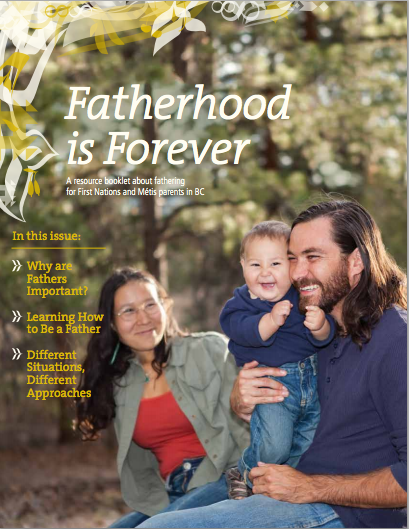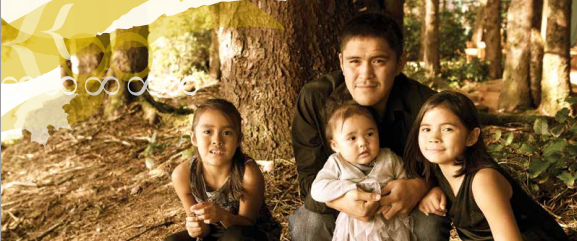Fatherhood is Forever: Information for First Nations & Metis Parents
Fatherhood is Forever, part of the NCCAH parenting series, is a resource booklet about fathering for First Nations and Métis parents in BC. It focuses on three areas:
- Why Are Fathers Important?
- Learning How to Be a Father
- Different Situations, Different Approaches
 The booklet was developed in response to requests from men who want to be more involved with their children, and is designed to help men become more confident and effective as fathers. It talks about why fathers are important, includes ideas of how to be involved at different stages of your child’s life, and shares information about traditional fathering roles. It also provides links to resources and services.
The booklet was developed in response to requests from men who want to be more involved with their children, and is designed to help men become more confident and effective as fathers. It talks about why fathers are important, includes ideas of how to be involved at different stages of your child’s life, and shares information about traditional fathering roles. It also provides links to resources and services.
Why Are Fathers Important? Who is a Father? - A man who takes responsibility for the children in his life. “Most fathers want to provide for their children. This includes things like a home, food and education. It also includes things like love, security and attention. Think of it as providing a safe place to grow. When their needs are met, children learn to trust that their father has their best interest in mind at all times.” Areas covered include:
- Spend time with your child
- Show affection
- Respect and honour the mother of your children
- Be a role model to build trust and security
- Remember that being a father is a life-long commitment
- Teach your child
- Share your traditions and your community
- Give clear guidance
- Set the standard
- Have reasonable expectations
- Give children experience
- Be supportive
Learning How to Be a Father: Recognizing that these days, fathers want to be more involved with their children, it is easy to discover that there is a lot to learn, especially if the father is isolated or did not have a role model to learn from. “The best thing about life is that it takes place in the moment. Every moment, you can choose a path of healing. Every step that you take in your own healing is a step towards becoming a better father.” Topics covered include:
- Our past affects fathers
- Moving forward (including accessing current role models, supports and services)
Different Situations, Different Approaches: Fathers raise children in many different situations. Parents may or may not be raising their children together. Distance, work, court or child welfare decisions may restrict frequent time together. Extended family may take the role of fathers. Sometimes children have special needs or medical issues that will affect their relationship with their father. No matter what the situation, children benefit from feeling love from their parents and learn about relationships through their interactions with parents. Topics covered include:
- Staying connected
- Strategies for working towards being father have you always wanted to be
- Involving your children
The booklet provides tips how to be involved with your child:
- Making healthy, informed decisions before pregnancy
- During pregnancy
- Baby
- Toddler
- Preschool
- School Age
Family Traditions: “Having traditions creates closeness and a sense of belonging. Traditions may be family or community practices. They give children positive memories of their childhood.”
Playtime: This section gives a background to why play is good for children, offers suggestions for approaches to play with children and turning everyday situations into play, along with the reminder that play is meant to be fun.
[hr]
Check out the other three booklets in this series:

